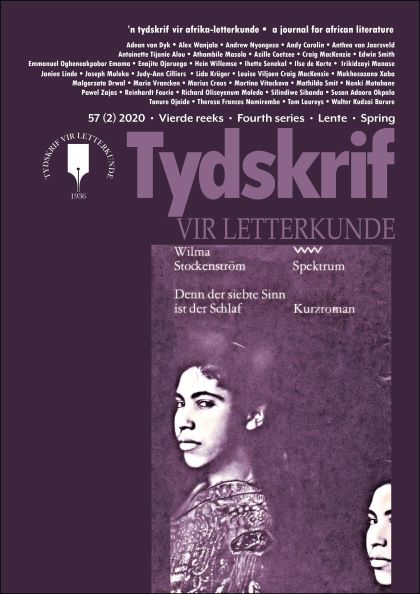Narrating the Ugandan nation in Mary Okurut’s The Invisible Weevil
DOI :
https://doi.org/10.17159/tl.v57i2.6424Mots-clés :
nation, narration, Ugandan literature, historiographyRésumé
This article seeks to study how Mary Okurut narrates the Ugandan nation through her novel The Invisible Weevil while at the same time exploring how the author centers upon women in her imagination of the new nation. The arguments in this article are derived from concepts proposed by Benedict Anderson and Homi Bhabha, among other scholars, on nationalism. These are arguments that explore the question of identity formation in nations and what holds these nations together in terms of their cultural standpoints and even at times a desire for a better nation for future generations. Through a close textual analysis that focuses on elements of narratology, the study explores the issue of nationalism in the novel. Of interest to this study is how Okurut as a contemporary writer engages history in the novel to narrate the nation and the challenges it faces as it evolves through different and tumultuous leaderships. The narration is undertaken through the viewpoint of various characters who describe different periods, thus creating a channel through which knowledge from each epoch is transmitted by the actions of women who attempt to define a new nation of Uganda that would be devoid of pestilence from ‘the invisible weevil’.
Téléchargements
Références
Anderson, Benedict R. Imagined Communities: Reflections on the Origin and Spread of Nationalism. Verso, 2016.
Ashcroft, Bill. The Post-Colonial Studies Reader. Routledge, 2011.
Bal, Mieke. Narratology: Introduction to the Theory of Narrative. U of Toronto P, 2017.
Barry, Peter. Beginning Theory: An Introduction to Literary and Cultural Theory. Manchester U P, 2017.
BBC. “On This Day 25 January. 1971: Idi Amin Ousts Ugandan President.” BBC News. http://news.bbc.co.uk/onthisday/hi/dates/stories/january/25/newsid_2506000/2506423.stm.
Bhabha, Homi K. The Location of Culture. Routledge, 1994.
Bhabha, Homi K., ed. Nation and Narration. Routledge, 2013.
Brennan, Timothy. Salman Rushdie and the Third World: Myths of the Nation. St. Martins, 1989.
Chatman, Seymour Benjamin. Coming to Terms: The Rhetoric of Narrative in Fiction and Film. Cornell U P, 2006.
Eley, Geoff & Ronald Grigor. Becoming National: A Reader. Oxford U P, 1996.
Fanon, Frantz. “On National Culture.” The Wretched of the Earth. Grove, 1963, pp. 36–52.
Gellner, Ernest. “The Coming of Nationalism, and Its Interpretation”. The Politics and Economics of Power, edited by Samuel Bowles, Maurizio Franzini & Ugo Pagano., 1998, pp. 179–224.
Genette, Gérard. Narrative Discourse: An Essay in Method. Trans. Jane E. Lewin. Cornell U P, 2006.
Hroch, Miroslav. From National Movement to the Fully Formed Nation. Haynes M, 1998.
Kiwanuka, M. S. The traditional history of the Buganda kingdom, with special reference to the historical writings of Sir Apolo Kaggwa. Diss. SOAS U of London, 1965. https://eprints.soas.ac.uk/29076/.
Kiyimba, Abaasi. “Male Identity and Female Space in the Fiction of Ugandan Women Writers.” Journal of International Women’s Studies vol. 9, no. 3, 2008, pp. 193–222.
Kruger, Marie. Women’s Literature in Kenya and Uganda: The Trouble with Modernity. Palgrave MacMillan, 2011.
Kyemba, Henry. A State of Blood: The Inside Story of Idi Amin’s Reign of Terror. Grosset & Dunlap, 1977.
Mwangi, Evan. Africa Writes Back to Self: Metafiction, Gender, Sexuality. SUNY, 2009.
Mukulu, Alex. 30 Years of Bananas. Oxford U P, 1993.
Simatei, Tirop. The Novel and the Politics of Nation Building in East Africa. Bayreuth U, 2001.
Odhiambo, Christopher. “Memory, Dialogue and Reconstruction of the Nation.” Tracks and Traces of Violence: Representation and Memorization of Violence: Views from Art, Literature and Anthropology, edited by Viviane Azarian. LitVerlag Münster, 2017, pp. 43–63.
Odhiambo, Christopher. “Whose Nation? Romanticizing the Vision of a Nation in Bole Butake’s ‘Betrothal without Libation’ and ‘Family Saga’.” Research in African Literatures vol. 40, no. 2, 2009, pp. 159–72. www.jstor.org/stable/40468121.
Okurut, Mary Karooro. The Invisible Weevil. Femrite, 1998.
Renan, Ernest. “What is a Nation?” Nation and Narration edited by Homi Bhabha. Routledge, 1990.
Téléchargements
Publiée
Numéro
Rubrique
Licence
(c) Copyright Tydskrif vir Letterkunde 2020

Ce travail est disponible sous licence Creative Commons Attribution - Partage dans les Mêmes Conditions 4.0 International.


 https://orcid.org/0000-0001-6465-6584
https://orcid.org/0000-0001-6465-6584


.png)